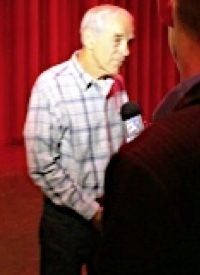
In spite of continued media silence on Paul’s campaign, yesterday’s crowd was only one in a string of filled-to-capacity venues for the 12-term Congressman from south Texas. And many of these large gatherings have been in smaller towns — such as Pineville and Hammond, both in Louisiana — with attendees often having driven long distances to hear him. Then there are the massive turnouts in places such as the campus of the University of California, Los Angeles (UCLA), where 7800 people showed up to hear Paul, some even climbing trees in order to get a look at him.
The Eagle of Bryan-College Station, Texas, reported that Paul "voiced his support for abolishing the Federal Reserve, to cheers, and ripped into U.S. military actions made without congressional approval and a federal deficit rising at $1.5 trillion a year and larger than it has ever been." The paper quoted the popular, anti-big government candidate’s statement: "The No. 1 problem we have today is we don’t have enough people in Washington who took their oath of office seriously to obey the Constitution."
Texas A&M’s student newspaper, The Battalion, reported that Paul reminded those attending the event that he is the only presidential candidate with military experience, having served in the Air Force during the Cuban Missile Crisis. “Thankfully, we didn’t have to resolve the Cuban crisis with nuclear power. … The Soviets collapsed because they overextended themselves,” the student paper quoted Paul. “No one is going to invade this country, this I know. Our greatest threat is at home.”
When questioned by The New American (press conference pictured above) as to whether his opponents had drawn anywhere near the multitudes that he enjoys, Paul replied, “Most of what I know is what I see on the Internet, and we seem to be drawing larger crowds than any of the others.” Indeed, one website shows Paul speaking to huge throngs in multiple locales — including the University of Maryland, the University of Wisconsin, the University of Illinois, and the University of Berkeley (California).
Meanwhile, an April 2 report from msnbc.com noted that Mitt Romney worries about “those embarrassing moments in the campaign where the crowds were thin or appeared thin.” Ironically, the same article stated that Romney was having a “… tough time matching crowds for all-but-forgotten GOP candidate Ron Paul. The Internet features some videos comparing crowd sizes of the two candidates, and it’s not pretty for Romney.”
Analysts say that Paul is far from forgotten, if crowd size is any indicator.
The New American also asked Dr. Paul if he had expectations about the realignment of delegates with Santorum out of the race. He responded, “Well, it should be beneficial; I’m cautiously optimistic. We’ll just work harder. The message won’t change; we’re still in it for the long haul.”
Paul asserted that his main concern is the cause of liberty, which soundly resonated with the Texas A&M audience of mostly students. Time after time during his speech, the septuagenarian drew enormous cheers, applause, and ovations from the buoyant crowd, clearly demonstrating his staying power in spite of news coverage to the contrary.
The Congressman’s campaign team emphasized to the mostly first-time voters at A&M the importance of delegates, which often has nothing to do with what mainstream media claim about who the winner of a caucus is or isn’t. As The New American’s Joe Wolverton, II has reported,
… Paul’s legions of loyal supporters argue that when the final results are tallied, their man will be found much higher in the delegate count than is regularly reported by the news media. They report that Dr. Paul is “building a delegate base under the radar of the party establishment by having his followers study the rules in caucus states and outmaneuver the other campaigns to get themselves chosen as delegates.”
Part of the Paul campaign’s delegate-gathering strategy was summarized in a March 19 article in USA Today that quoted campaign spokesman Jesse Benton:
Although Paul failed to win caucuses in states including Colorado, Iowa, Washington and Alaska, the process of awarding delegates in those states is not yet complete, leaving the door open for the Paul campaign.
Benton explained that while Paul hopes to win delegates in later primaries like California and Paul’s home state of Texas, the current focus is using Paul’s vast grass-roots network to pick up delegates during state conventions.
The Paul campaign is targeting the meetings held in counties around the country that are part of the process of choosing national convention delegates, hoping to assure selection of Paul allies.
The wildly popular Dr. Paul is giving the remaining two GOP candidates a run for their money. And analysts have noted that now that Rick Santorum has suspended his campaign, the mainstream media will find it increasingly difficult to ignore the Texas Congressman.
Dr. Paul will continue his Texas tour Wednesday night, April 11, with an event at Fort Worth’s Will Rogers Memorial Auditorium, and with a Thursday night “town hall” event at the Main Plaza of downtown San Antonio.
Photo of Ron Paul: Kelly Holt



